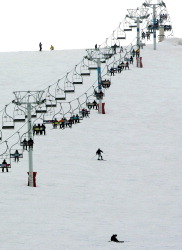 FARAYA, Lebanon — When Mart Maastik’s friends suggested a ski vacation in Lebanon, he was hesitant — and more than a little skeptical, especially about security."Skiing in the Middle East? I’d never heard of that," the 41-year-old Estonian said while standing in full skiing gear at the foothills of the Faraya-Mzaar mountains.
FARAYA, Lebanon — When Mart Maastik’s friends suggested a ski vacation in Lebanon, he was hesitant — and more than a little skeptical, especially about security."Skiing in the Middle East? I’d never heard of that," the 41-year-old Estonian said while standing in full skiing gear at the foothills of the Faraya-Mzaar mountains.
But Lebanon, with six ski resorts and a season that generally runs from December through April, is increasingly drawing not just Arab tourists, but Europeans, too, industry officials say. Maastik, who is in the real estate business back home, has skied in Austria, Andorra, France "and almost everywhere else," but he feels Lebanon’s slopes have a different flavor."This is quite exotic for us," he said, saying he was taken with Lebanon’s hospitality and its good weather. He said he was worried about security at first. "But I decided to forget about politics and come anyway."
Business at the area’s biggest hotel, the InterContinental Mountain Resort & Spa, plunged more than 30 percent in 2005 because of political instability in Lebanon, general manager Robert Zogbi said. The country has seen at least 16 bombings since October 2004, the largest of which killed former Prime Minister Rafik Hariri a year ago.
But the five-star lodge, sitting only few hundred meters (yards) from the nearest slopes, has managed to offset losses. It had a 98 percent occupancy rate in February, Zogbi said.
Many foreigners come to Lebanon for the cheaper prices and relaxed atmosphere. The weather, less stormy and more sunny during the skiing season than at many European resorts, is also an attraction, as is the mountains’ nearness to the coast and Beirut.
"You can ski in the morning and go fishing or shopping or sightseeing in the afternoon. It’s a very unique advantage," Zogbi said.
The best equipped and most popular of Lebanon’s ski areas is the Faraya-Mzaar area, a one-hour drive northeast of Beirut. The resort has around 20 slopes and 85 kilometers (53 miles) of ski trails. Other areas include Laqlouk, Zaarour and The Cedars — the highest of the resorts with an altitude above 2,000 meters (6,600 feet).
Sam Waugh, 22, a learning support teacher from Britain, said he’d always wanted to learn skiing but was too intimidated to do it in Europe. So when his brother who works in a refugee camp in Beirut suggested Lebanon, he agreed.
"It’s really good. No one laughs when you fall here. No one cares," he said as he struggled in his skis.
Although there are no official figures for the number of visitors, industry officials say the number of visitors is growing, with tourists coming from all over the Arab world and Europe.
Skiing as a leisure sport is catching on among Arabs, most of whom live in hot, desert countries. "We’re getting young people from the UAE (United Arab Emirates), Kuwait, Jordan, as well as Western expatriates living in those countries," said Nicole Wakim, sales and marketing manager for the Faraya-Mzaar resort.
An indoor ski dome was opened last year in Dubai, complete with snowmaking jets and huge air conditioners to simulate the real thing.
Zogbi doesn’t view that as competition. On the contrary, he said, it creates new business by encouraging young people from the Persian Gulf to come to Lebanon’s slopes for the real thing.
He said Lebanese resorts also have benefited from toughened security in Western nations since the Sept. 11 attacks in the United States.
"All the Arabs who used to go to foreign countries suddenly became subject to intense scrutiny. Arabs do not like that and are choosing to come here instead," he said.
Not everyone comes to Faraya-Mzaar to ski. The snow itself is a big attraction for people from desert countries.
Tourists from the Persian Gulf, some of them women wearing traditional black robes, are often seen tossing snowballs at each other, snapping pictures with their mobile phones or enjoying a ride on the ski lifts.
"This is so beautiful," said Maha Suleiman, a Kuwaiti woman sitting with her family on the snow, a dazzling white from the blazing sun.
Suleiman said it was her first time in Lebanon, but said she would return so her daughter could learn to ski.
"Yes, please!" squealed 10-year-old Ruqaya. "I want to."
Many Lebanese also come to the resorts just to hang out. At a restaurant at the foot of the mountains, Lebanese women in tight jeans and designer sunglasses sit side by side with cigar-smoking men, lazily enjoying the view.
"It’s a charming place. I love Lebanese food — and Lebanese women," said a smiling Philipe Lafon, a French businessman who sat munching a hamburger under a clear blue sky facing the white mountains. "I will surely be back." (AP)



